T-Mobile and Sprint merger OK'd, creating big, new No. 3 wireless carrier
- The Department of Justice on Friday approved T-Mobile's $26.5 billion merger with Sprint to make a new No. 3 competitor in the mobile phone business that approaches the size of market leaders Verizon and AT&T.
- One big condition: The two wireless providers will have to divest enough assets to make Dish a new wireless competitor, too.
- Dish will have access to T-Mobile's network for seven years, while it builds out its own system.
The Department of Justice on Friday said it approved T-Mobile's $26.5 billion merger with Sprint, after the telecommunications companies agreed to divest enough telecom assets to allow TV provider Dish to become a wireless competitor.
The combined T-Mobile and Sprint would become the No. 3 competitor in the mobile phone business, with a roughly 30% market share that approaches the massive scales of longtime market leaders Verizon and AT&T.
T-Mobile and Sprint will divest Sprint's prepaid cellular business, which includes Boost Mobile, Virgin Mobile and Sprint prepaid, to Dish Network Corp., making the Colorado-based satellite television provider a major wireless competitor. T-Mobile and Sprint must also share at least 20,000 cell sites and hundreds of retail locations with Dish, per the terms of the proposed settlement.
Dish will have access to T-Mobile's network for seven years, while it builds out its own 5G network.
The TV provider will provide real competition immediately, per the terms of the deal. "Dish will have 9 or 10 million customers from the beginning," said Assistant Attorney General Makan Delrahim. "This will not be a startup."
The merger — and accompanying divestiture — will transform currently unused airwaves into high-quality 5G networks for American consumers.
Delrahim said at a press conference Friday that he expects consumers will be able to more affordably access wireless service. "Our job was to preserve competition and I wouldn't be surprised if you had lower prices," he said.
But some consumer advocates, including Public Knowledge, a Washington, D.C.-based non-profit, argue the deal will do just the opposite.
"Allowing T-Mobile to acquire Sprint and consolidate the wireless market from four competitors to three would inevitably mean higher prices for consumers and a less competitive and dynamic marketplace," said Philip Berenbroick, the organization's policy director.
Berenbroick doesn't believe that Dish will be able to effectively compete in the near-term against the new Big Three in mobile that combined would have more than a 95% share of the market.
"Sprint is a significantly stronger competitor today than a new fourth competitor could be for the foreseeable future," he said. "The struggles that Dish and other would-be new entrants have consistently faced underscore that even with the best of intentions and a full commitment to deploy and compete, nothing is certain. Consumers will face considerable harm if the marketplace does not develop as the DOJ envisions."
In 2018, T-Mobile posted revenues of more than $43 billion. Sprint posted revenues of over $32 billion for the same year.
The Justice Department's settlement must now be approved by a federal judge.
Jeff Pegues contributed to this report.



